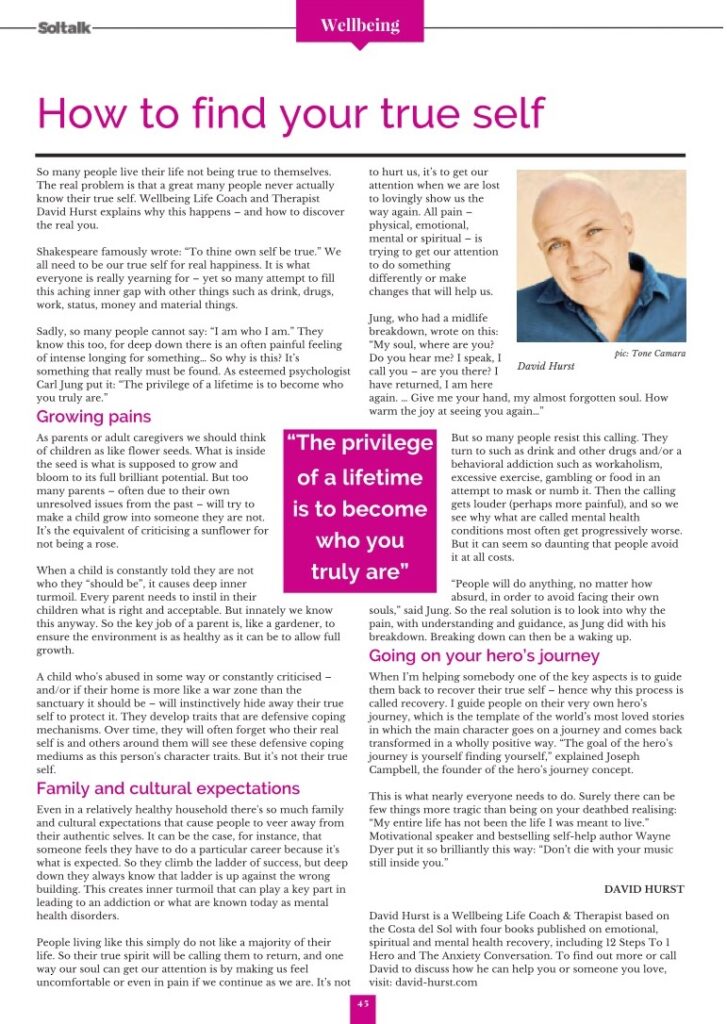How to find your true self

So many people live their life not being true to themselves. The real problem is that a great many people never actually know their true self.
Shakespeare famously wrote: “To thine own self be true.” We all need to be our true self for real happiness. It is what everyone is really yearning for – yet so many attempt to fill this aching inner gap with other things such as drink, drugs, work, status, money and material things.
Sadly, so many people cannot say: “I am who I am.” They know this too, for deep down there is an often painful feeling of intense longing for something… So why is this? It’s something that really must be found. As esteemed psychologist Carl Jung put it: “The privilege of a lifetime is to become who you truly are.”
Growing pains
As parents or adult caregivers we should think of children as like flower seeds. What is inside the seed is what is supposed to grow and bloom to its full brilliant potential. But too many parents – often due to their own unresolved issues from the past – will try to make a child grow into someone they are not. It’s the equivalent of criticising a sunflower for not being a rose.
When a child is constantly told they are not who they “should be”, it causes deep inner turmoil. Every parent needs to instil in their children what is right and acceptable. But innately we know this anyway. So the key job of a parent is, like a gardener, to ensure the environment is as healthy as it can be to allow full growth.
A child who’s abused in some way or constantly criticised – and/or if their home is more like a war zone than the sanctuary it should be – will instinctively hide away their true self to protect it. They develop traits that are defensive coping mechanisms. Over time, they will often forget who their real self is and others around them will see these defensive coping mediums as this person’s character traits. But it’s not their true self.
Family and cultural expectations
Even in a relatively healthy household there’s so much family and cultural expectations that cause people to veer away from their authentic selves. It can be the case, for instance, that someone feels they have to do a particular career because it’s what is expected. So they climb the ladder of success, but deep down they always know that ladder is up against the wrong building. This creates inner turmoil that can play a key part in leading to an addiction or what are known today as mental health disorders.
People living like this simply do not like a majority of their life. So their true spirit will be calling them to return, and one way our soul can get our attention is by making us feel uncomfortable or even in pain if we continue as we are. It’s not to hurt us, it’s to get our attention when we are lost to lovingly show us the way again. All pain – physical, emotional, mental or spiritual – is trying to get our attention to do something differently or make changes that will help us.
Resisting the calling
Jung, who had a midlife breakdown, wrote on this: “My soul, where are you? Do you hear me? I speak, I call you – are you there? I have returned, I am here again. … Give me your hand, my almost forgotten soul. How warm the joy at seeing you again…”
But so many people resist this calling. They turn to such as drink and other drugs and/or a behavioral addiction such as workaholism, excessive exercise, gambling or food in an attempt to mask or numb it. Then the calling gets louder (perhaps more painful), and so we see why what are called mental health conditions most often get progressively worse. But it can seem so daunting that people avoid it at all costs.
“People will do anything, no matter how absurd, in order to avoid facing their own souls,” said Jung. So the real solution is to look into why the pain, with understanding and guidance, as Jung did with his breakdown. Breaking down can then be a waking up.
Going on your hero’s journey
When I’m helping somebody one of the key aspects is to guide them back to recover their true self – hence why this process is called recovery. I guide people on their very own hero’s journey, which is the template of most of the world’s most loved stories in which the main character goes on a journey and comes back transformed in a wholly positive way. “The goal of the hero’s journey is yourself finding yourself,” explained Joseph Campbell, the founder of the hero’s journey concept.
This is what nearly everyone needs to do. Surely there can be few things more tragic than being on your deathbed realising: “My entire life has not been the life I was meant to live.” Motivational speaker and bestselling self-help author Wayne Dyer put it so brilliantly this way: “Don’t die with your music still inside you.”
(This is my latest article for Soltalk magazine: http://www.soltalk.com/comment/july-2022/ )
